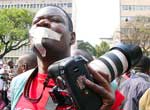Time to entrench media freedom in Kenya’s constitution

While Article 39 of Kenya’s Revised Harmonised Draft Constitution makes giant steps in guaranteeing media freedom, Henry Maina finds it still lacking. Maina explores Article 39’s shortcomings in the areas of licensing, censorship and confidentiality and suggests some fundamental safeguards as solutions.
To many observers, the latest onslaught by the Kenyan government on the media through the publication of media regulations comes as no surprise. Most governments globally seek to control the media for fear of being executed in the people’s court. They thus tend to use coercive power to gag the media.
It is with this in mind that ARTICLE 19 welcomes the explicit guarantee of the freedom and independence of all types of media, including state-owned, in Article 39 of the Revised Harmonised Draft Constitution. Three reasons inform this endorsement. First, such a proclamation in the constitution can serve as a useful tool for journalists and the media, who seek to protect themselves from interference. Second, that the draft prohibits the exercise of state control in the media field is praiseworthy. Third, it makes explicit provisions concerning licensing.
The experience of licensing worldwide demonstrates that states often silence critical voices or give advantage in the media to persons close to them by the use of licensing. In this respect, a constitutional provision guaranteeing the independence of the licensing body is appropriate and needed. Article 39, paragraph 3, however, falls short in securing the independence of both the licensing body and the licensing procedures. A number of safeguards are necessary to secure the independence of a licensing body.
First, the licensing body should not be part of any government institution, that is, its members should not be appointed by the government. ‘Rules of incompatibility’ should apply to candidates for membership on the board. Second, once appointed, members of the licensing board should be protected against removal outside of exceptional circumstances. Third, the regulatory body should be accountable to the public through a multiparty body, such as parliament or a parliamentary committee. Fourth, the body should be adequately funded in a way that protects it against political interference. The non-recognition of these standards by the draft weakens the protection of the licensing body against political interference and governmental manipulations, despite the good intention of the drafters.
Further, while the draft permits licensing of broadcasting and ‘other electronic media’, it is unclear what is meant by ‘other electronic media’. To some commentators, this provision may be lauded as progressive as it anticipates future growth and for sure the media sector witnesses discoveries by the day. Such an ambiguous provision, however, may be interpreted in various ways and used as justification for licensing of internet providers or internet-based media. This is made worse given that the draft ill-defines the purpose of licensing and does not aim at protection of pluralism. Paragraph 3 sets out that the licensing procedures ‘shall be designed to ensure the necessary regulation of the airwaves and other forms of signal distribution’. The interpretation of the provision makes it possible to conclude that the licensing body is free to choose how to regulate the airwaves. Licensing is a form of regulation of airwaves and, as such, interferes with the right to freedom of expression, hence the need to ensure that it responds to only legitimate aims in a democracy like safeguarding pluralism in the media. Any licensing body, therefore, is obliged to promote and protect pluralism by ensuring a diversity of broadcasting organisations, of ownership of those organisations, and of viewpoints and languages represented in the programmes they carry.
While the draft provides for independence of state-owned media, it is prudent that it should ensure guarantees for the independence of all public media, as opposed to state-owned media. This is because public media more effectively serve the interests of the people and ought not to be under the direction of governments, but of independent boards of governors. Further, public media’s mission is not to be a mouthpiece of the government but to promote the public interest, including through politically impartial reporting. State-owned media, like our KBC (Kenya Broadcasting Corporation), are less likely to accomplish this mission because they are under the control of the government.
The Draft Constitution, just like the recently published media regulations, re-introduces statutory media self-regulation. This is an oxymoron of sorts. Self-regulation implies that journalists and publications take it upon themselves to regulate the media. In other words, self-regulation excludes interference from any state institution, including Parliament. The provision in Article 39, paragraph 4, goes beyond this standard by imposing an obligation on Parliament to regulate media self-regulation.
In sum, the constitutional regime proposed by the draft has two major shortfalls with regard to media freedom. Firstly, the draft does not contain a prohibition of prior censorship. Explicit prohibitions on censorship can be found in a number of national constitutions. The prohibition recognises that no person or media should have to ask the permission of a state body before publishing. This will also render nugatory the provisions in the recently published regulations that criminalise ‘unconfirmed reporting'. Secondly, it fails to protect the confidentiality of journalist sources. The right to protection of journalistic sources is well recognised in international law as an essential corollary of the right to freedom of expression. It protects journalists from arrests and prohibits their offices from being searched and their equipment seized for identification of their sources. The lack of adequate domestic protection for journalists’ sources is one of the major obstacles for freedom of the media. For that reason, I recommend that the draft follow the example of other countries, like Portugal and Macedonia, in explicitly providing for a right to the protection of journalistic sources.
BROUGHT TO YOU BY PAMBAZUKA NEWS
* Henry Maina is director of ARTICLE 19 Eastern Africa.
* Please send comments to [email protected] or comment online at Pambazuka News.
